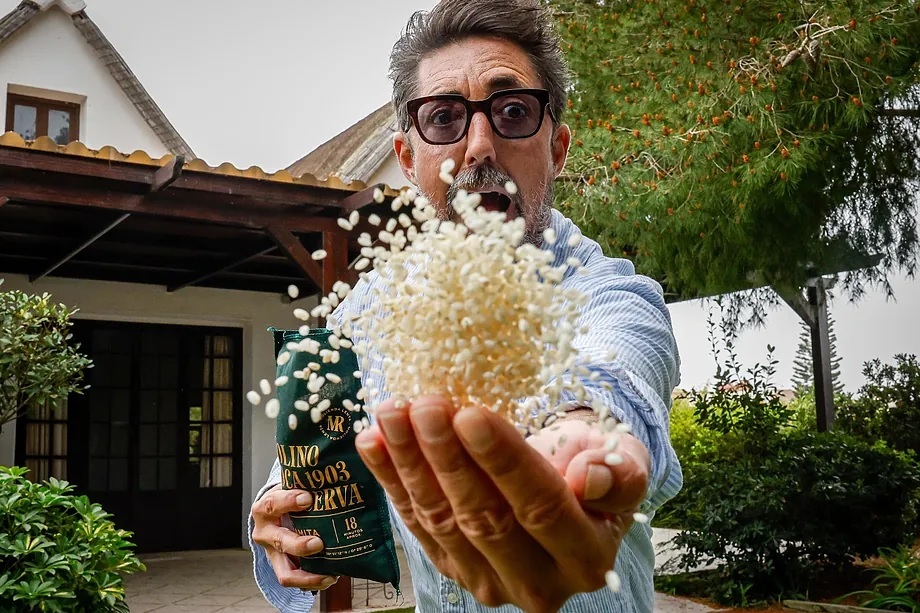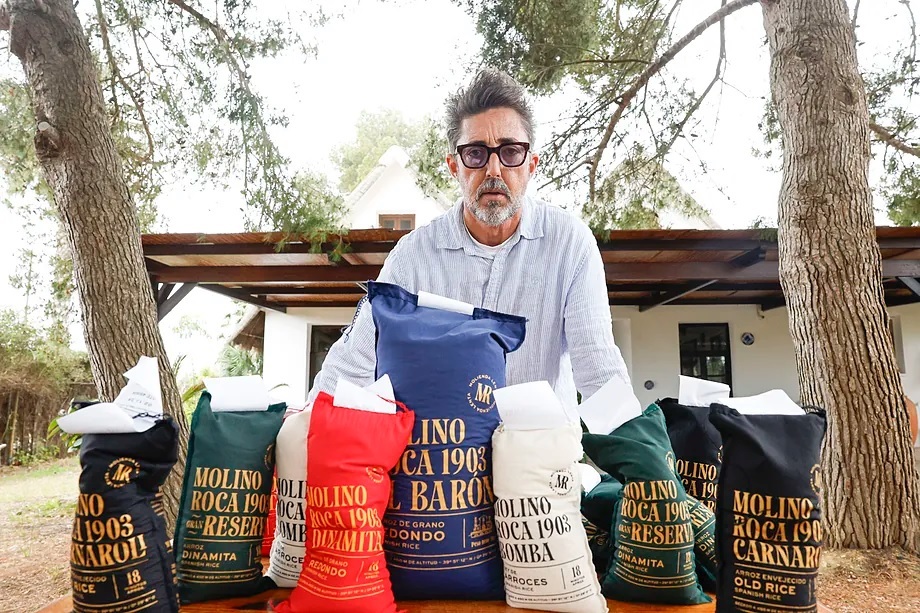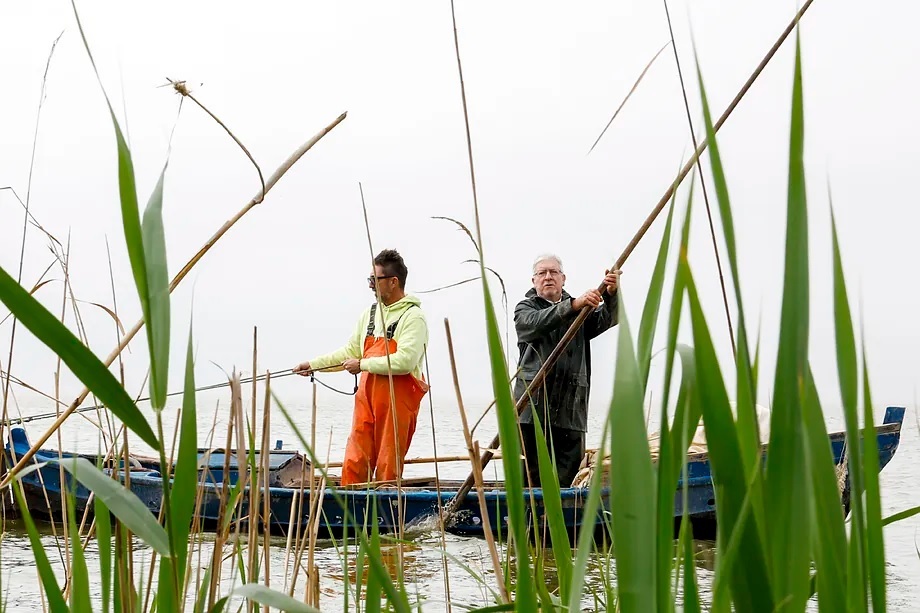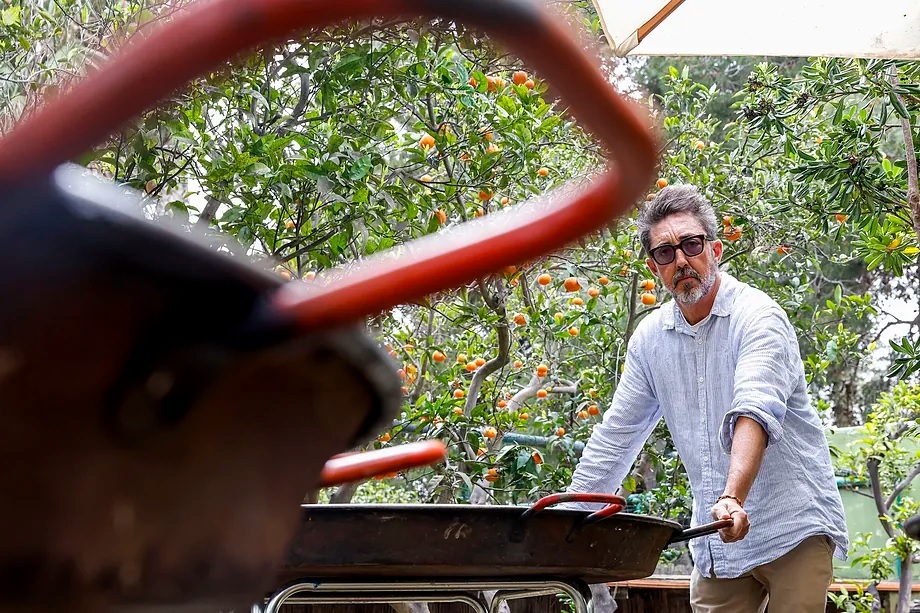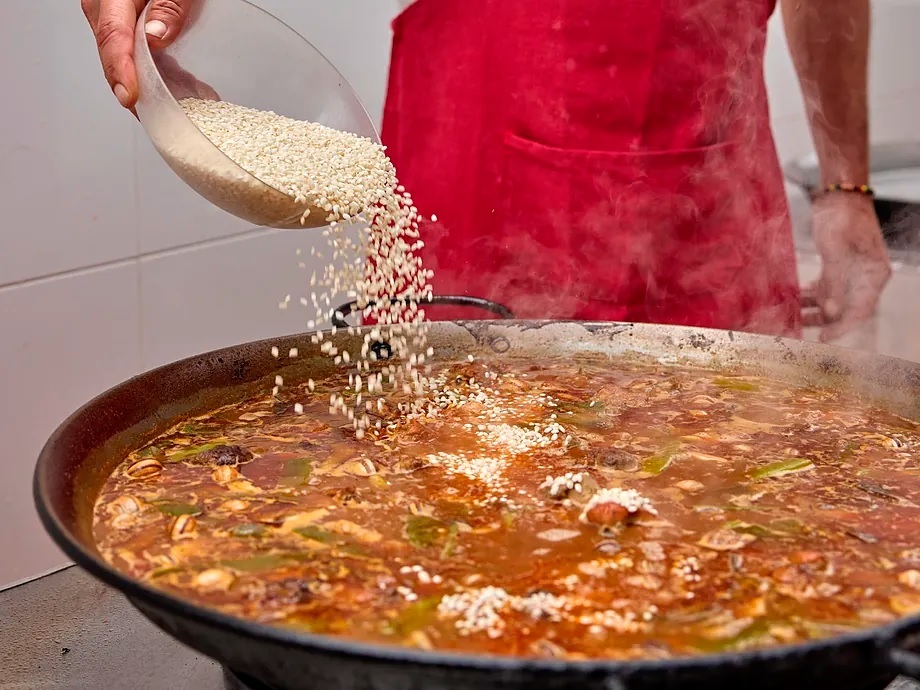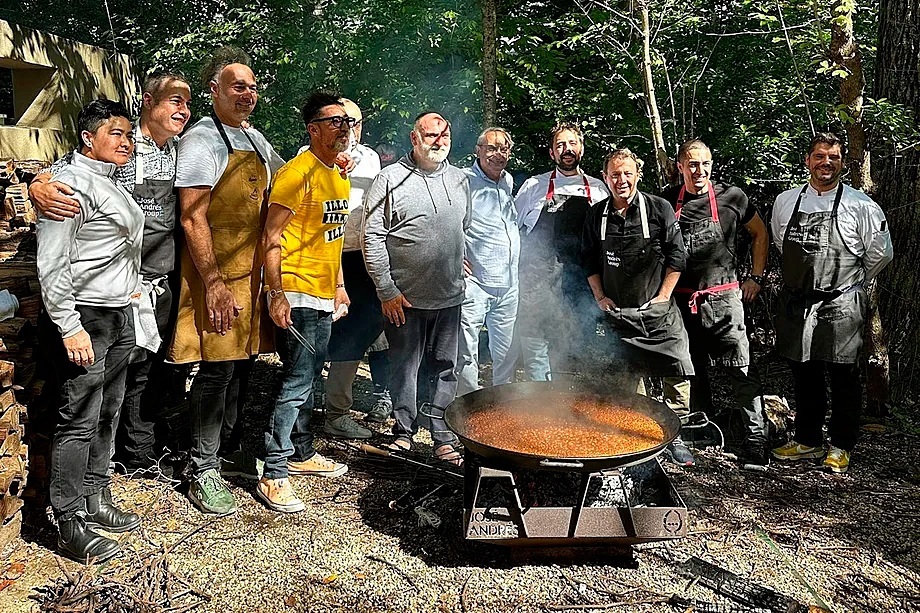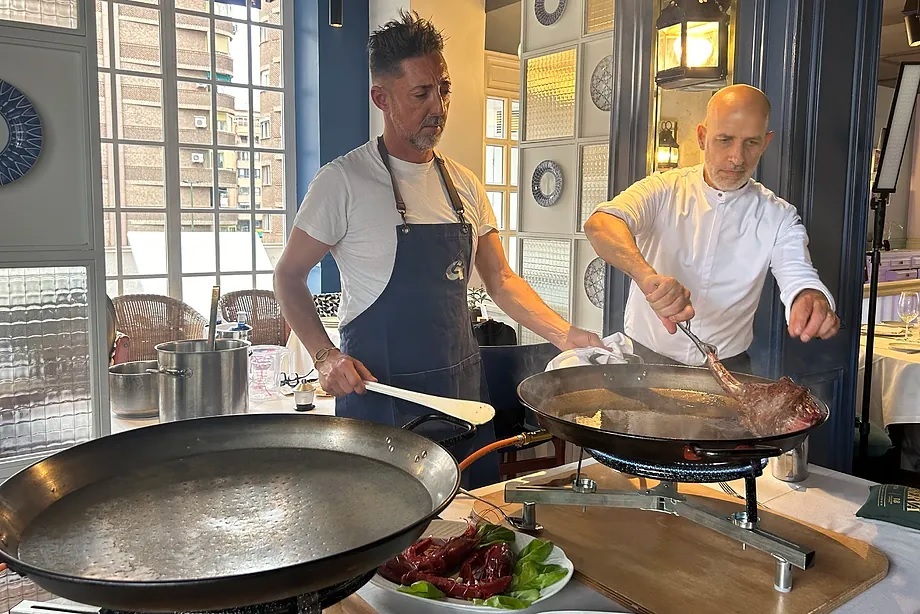Edu Torres (Valencia, 47 years old) knows what it's like to flirt with ruin, even though his name and that of Molino Roca - a family company whose origins date back to 1903 and has been dedicated to rice selection for the hospitality industry for four decades - seem linked like siamese twins to success. Today, "24,000 restaurants, large and small, from all over the world cook with our rice." The same rice that in recent years has driven top chefs crazy, some even tattooing Dinamita, his brand that triumphs in haute cuisine, on their arms.
He doesn't wear it tattooed on his skin but on his back and inside that backpack he carries every - or almost every - day of the year with small bags of Dinamita, Bomba, Gran Reserva, and even an aged carnaroli made in Spain - his four brands; dehydrated broth made for him in Menorca, saffron, olive oil, and a scraper.
These are the tools of this rice grower around the world who travels 100,000 kilometers a year to "with all the possible humility" explain - and train - client by client "how to achieve the perfect rice."
And how does he do it? With a nailed standard, where everything is measured and weighed and where "by eye" and "adding broth until the screws" are banished. "The paella that a customer eats today must be the same when they return in the future or, if they have more locations, it must taste the same in all of them." It must not lack "its three textures: bottom crust, edge, and center with the socarrat," details this Mediterranean Phileas Fogg without mincing words.
"It is clear that there is only one Valencian paella, but I put whatever I want on a paella. For example, a seared piece of meat that will leave its flavor in the broth and impregnate the grain as the rice dries. What's the problem if someone enjoys eating a single-layer rice, very much in line with current tastes, which also increases sales in restaurants?".
Edu continues with the warrior thread: "Or that Dabiz Muñoz, a globally renowned genius, achieves a broth with six, 20, or 30 ingredients and that they all make sense in a paella, including grated chocolate? He is doing great things for paella, and some tell him not to come to Valencia... Without innovation, things die, and without a current perspective, tradition can sometimes become a straitjacket."
A contemporary perspective that, along with renewed tradition in their crops, R&D, and didactic work, is in Molino Roca's DNA. "Everything evolves, except for those who always have the phrase 'It has always been done this way...' in their mouths. We have developed a grain based on the needs of our chefs, and they understand that it is an opportunity for their business and for sales growth," he says, temporarily leaving the combative thread.
A promoter - even a "psychopath" - of this rice, he might make a street paella in Brooklyn, with Spanish ministerial presence included ("Luis Planas, from Agriculture, Fisheries, and Food"), or prepare one with camel at the Ritz in Riyadh (Saudi Arabia); "that is, with products from his KmO"... Or cook with José Andrés in Washington or in Valencia with his NGO (World Central Kitchen), as he did during the October DANA delivering hot meals to the victims.
"I recruited chefs, Luis Valls (El Poblet restaurant) and Javi Sanz and Juan Sahuquillo, from Cañitas Maite, Oba, and Cebo, among others; we served thousands of meals a day; hand in hand with José Andrés, I learned to navigate chaos. We cried a lot and slept little for 45 days, but it was necessary to the fullest... And how comforting the street paellas were!" he recalls.
Since 1903. The face of the family company, he travels non-stop; participates in culinary realities; is preparing a book with Planeta publishing about paellas with KmO that "will be published in June" and has participated "in a Disney+ documentary about rice, coffee, and corn that will premiere soon. We filmed at the mill, in the crops... And I cried talking about my grandfather, my father, and this business that was born from ruin." Because behind the success and the numbers they handle today ("in 2024, we sold 3.5 million kilos of rice, and for this year, we expect to sell six million; we are very small, that's what makes a strong group in a week"), there is "humility," a word that Edu repeats like a mantra in this interview.
"Humility" and also a lot of hard work. A lot of falling and getting up, his and the four generations that preceded him, because this rice dynasty started in 1903 with great-great-grandfather José Roca and a mill (called Arrocería Roca), located on Guillem De Castro, what is now the old town of Valencia; it continued with Torca and is now Molino Roca.
The first crisis that Edu experienced - and recounts - takes him back in time: 40 years ago, when his grandfather Gonzalo, "passionate about rice and machines that make life easier, went bankrupt trying to compete with large retailers like Continente, which brought him to the brink of bankruptcy. Then, he stepped aside, and my father, Eduardo, took over." A bad streak that lasted a decade and that he remembers as if it were today. "I must have been about five years old: the kids laughed at me because I always wore the same clothes, and many times my mother would give me a sandwich with oil and a little paprika. Later, for the same reason and because I didn't wear brand-name sneakers."
But these Torres are ones to rise, to change course, and to go against the current. "My father said he would never sell to supermarkets again and insisted on finding a rice for and by the chef. He was the first to plant bomba rice in Valencia, which he discovered in Calasparra. He partnered with Juan Haro, whom we called 'Uncle,' and learned to make rice for the chef." And, as if it were yesterday, Edu is once again the 8-year-old boy who went with his father to distribute it with a cart.
"People laughed at him because he tried to sell something that cost three times more. They told him it was for people who didn't know how to cook because it didn't stick, and that they would stop buying from him." That idea of stopping buying, "which might have been a way of talking among themselves, stayed with me as a trauma." And there he is, because when hunger has ever occupied the soul, there is no evicting it.
"It was very tough for us. My father even sold the house to keep the business afloat, and we really went hungry. That's why, and because work is health for me, I work 18 hours a day, and if a customer sends me a WhatsApp with an order at two in the morning, I reply. I still fear that things might go wrong, and I carry that deep inside." Just like the first two customers who "got us out of the hole, who saved our lives: Meliá hotels and Casa Gerardo, from the Oter Group, now with 27 locations. They bet on us and continue to do so," he proudly recounts, both as his own achievement and as a son.
"From my father, I learned to take care of the customer; to go with the car and a map visiting one by one; taking care of the business." He unloaded trucks on weekends; taught the cooks the secrets to working with this rice and cooked with them, one of the "gifts" of his work, because Edu is, as he likes to say, a "rice man," and has a good hand for cooking. During the week, he studied Drafting out of paternal obligation... Until at 21, he joined a German multinational tools company -Würth-, where "they taught me to sell like a psychopath. I did many trainings; I led a team of 10 salespeople and spent 16 years with them."
But he didn't break the umbilical cord. A decade ago, the patriarch of the Torres family was struggling through the great crisis. "I decided to leave the multinational and start working with him as a freelancer. He told me I was crazy, that I was going to ruin myself. But I took, as he did before, the car, the notes from my grandfather's mill, and visited each and every cook." These new beginnings were tough, "nobody wanted to buy," but if there was one thing Edu knew, it was how to sell and about rice.
And what is this Mediterranean rice that has deeply penetrated haute cuisine and that individuals can buy at El Corte Inglés? A product "with a zero impurity rate, which we produce 50% in fields of Valencia and in the Ebro Delta to not have all eggs in one basket. We dry it at 500 meters of altitude, a decision made many years ago by my father, where the grain's moisture evaporates quickly."
A cereal that chefs reserve and cultivate with a network of farmers, "some inherited from my grandfather and also new generations. Among them and the mill workers, we are about 70." The figure includes his father, who is always in the fields with the farmers; his brother, "who just by hearing a machine knows what's happening, and my sister who, although she has her own job, remains connected."
Outside the D.O.P Arroz de Valencia, "which I respect a lot; but my business line is different," he claims that he also promotes his local region, "even though we have big critics there. In my own way, I also highlight Valencia, its people, and take it around the world." He even brings the world to the heart of Albufera, through Clandestinos, a celebration that recognizes the role of rice in gastronomy and the figure of farmers, attended by chefs megatop who come "on their own" means. In the third edition, held last October, 55 rice dishes were prepared. "It wasn't a competition; each chef made their rice, without egos involved; the one from the Canary Islands learning from the one from Mallorca; the one from Menorca from the one from Andorra...".
Regulars at this event include Mario Sandoval (Coque), Paco Roncero (Paco Roncero Restaurante), Chef Momo (La Perla, Bath, UK), Rubén Guerrero (99 Sushi Bar Abu Dhabi); Rodrigo de la Calle (El Invernadero), "my brother, has always trusted me"... Or Ángel León (Aponiente), with whom he collaborated to develop a recipe for the NASA and the Canadian Space Agency contest that sought the food astronauts will consume on space missions. "A moon rice where Ángel freeze-dries the microalgae that squids eat. We created a rice that made me cry because it tasted like squid without actually being it."
If something has inspired Molino Roca, "besides the effort of the farmers, it is working with the chefs." A couple of weeks ago, Edu was in Augusta (US) cooking with José Andrés and telling him, among other things, details of the documentary that "Disney + will soon release; my episode revolves around tradition not being a straitjacket." It couldn't be any other way if this "rice enthusiast, with great honor," is involved.
